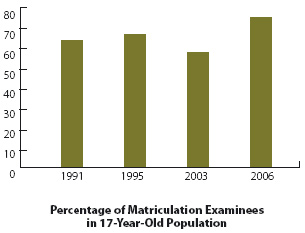The majority of secondary schools offer academic curricula in science and in the humanities leading to a matriculation certificate and higher education. Certain secondary schools offer specialized curricula, which lead to a matriculation certificate and/or vocational diploma.
Technological schools train technicians and practical engineers on three levels, with some preparing for higher education, some studying towards a vocational diploma, and others acquiring practical skills.
Agricultural schools, usually in a residential setting, supplement basic studies with subjects relating to agronomy.
Military preparatory schools train future career personnel and technicians in specific fields required by the Israel Defense Forces.
Yeshiva high schools, mainly boarding schools, with separate frameworks for boys and girls, complement their secular curricula with intensive religious studies and promote observance of tradition and a Jewish way of life.
Comprehensive schools offer studies in a variety of vocations, ranging from bookkeeping to mechanics, electronics, hotel trades, graphic design, and more.

Youth not attending one of the above schools are subject to the Apprenticeship Law, requiring them to study for a trade at an approved vocational school. Apprenticeship programs are provided by the Ministry of Industry, Trade, and Labor in schools affiliated with vocational networks. Lasting three to four years, these programs consist of two years of classroom study followed by one/two years during which students study three days a week and work at their chosen trade on the other days. Trades range from hairstyling and cooking to mechanics and word processing.
Intermediate School technology class (Photo: GPO / A. Ohayon)